Civil Engineering
Software for Drawing, Design & Simulation Outdoor Survey Practices MOUs for Internship Engagement Real Life UG Projects
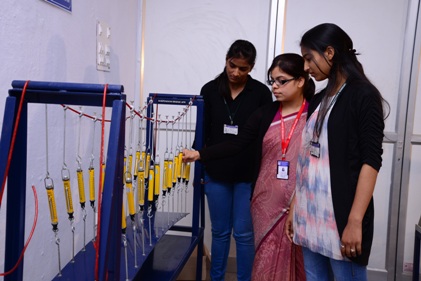
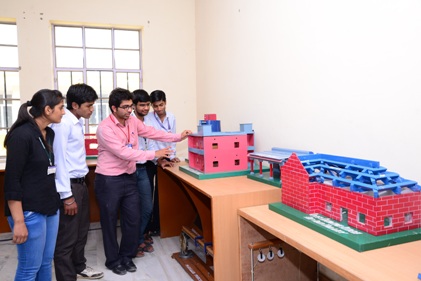
Overview: Best Civil Engineering college in jaipur
Civil Engineering is the mother of all engineering disciplines. In India, civil engineers form the largest proportion of the engineering workforce. This discipline offers a virtually unlimited range of career opportunities in construction and material management to satisfy individual interests, aptitudes and goals. It may also serve as a transition to other fields like surveying, mining, or environmental engineering. A career in civil engineering may involve teaching, research, consulting, contracting, and management. A career in research provides the civil engineer with the opportunity to examine a vast spectrum of problems ranging from geo-environmental engineering to material science. Recent developments in modern methods of designing civil engineering structures have spurred a growth in computer use. In this area, a career in civil engineering may lead to prominent fields such as computer aided design and computational mechanics. Work in this field may take you around the corner or around the world.
Civil engineers use principles of materials science, structures, water resources engineering, geotechnical engineering, transportation planning, and solid mechanics to create structures and systems. Civil engineers are involved in the design, construction, and management of highways, railways and transit systems, airports, harbors, bridges, tunnels, canals, irrigation schemes, and buildings. Civil engineers also ensure the availability of high quality water supplies and sewage treatment facilities.
Some of the specialty fields of study in civil engineering are:
- Water resources engineering: This area of expertise is concerned with solving problems associated with the control and safe, sustainable use of water.
- Structural engineering: As the name implies, structural engineers plan and design all kinds of structures including bridges, buildings, containment facilities and towers.
- Analyzing the forces that each structure must resist, these engineers work to produce a safe and economical structure.
- Transportation engineering: These engineers plan, design, construct and operate street systems, highways, railroads, airports, and harbors.
- Geotechnical engineering: The properties of soil and rock are the province of these engineering specialists. They evaluate the potential settlements of buildings, the stability of slopes and fill areas and analyze landslides, seepage of groundwater and the effects of earthquakes.
- Working with structural engineers, geotechnical engineers help in the construction of dams, tunnels and the foundations of buildings.
- Construction engineering: Construction engineers are team leaders who ensure that projects are completed safely, on time and within budget. They use their knowledge of engineering and management to plan and execute projects.
- Municipal engineering. These engineers specialize in systems that support urban centers; designing and building power grids, water treatment and waste management systems, and transportation networks.
Career in Civil Engineering
There is no one typical path for civil engineers but within each subfield the details of a career path can vary. Most engineering graduates start with the basics and as they prove their competence they are given more and more responsible tasks. Senior engineers involve in more complex design works or management of junior engineers or into specialized consulting.
Civil Engineering deals with the design, construction and maintenance of the natural built environment including works such as, bridges, roads, canals, dams, airports, highways, buildings, flyovers, tunnels, chimneys and offshore structures. The Branch plays a very critical role in water resource/environment
About the Department of Civil Engineering
Academics
- Good team of faculty combined with strong teaching, learning process for innovative ideas.
- Faculty Development Program in place.
- Well stocked department library of Books.
- Track record in Results.
- Field visits, and invited talks.
- Student Counseling & Tutorials.
Infrastructure Facilities
The department of Civil Engineering has eight well equipped laboratories:
- Engineering Geology Laboratory
- Computer Aided Design Laboratory
- Concrete Technology Laboratory
- Environmental Engineering Laboratory
- Geotechnical Engineering Laboratory
- Hydraulics and Hydraulic Machines Laboratory
- Highway Technology Laboratory
- Building Material Testing Laboratory
- Surveying laboratory
These laboratories are effectively utilized for teaching, and for consulting activities. Some of the equipments available in the laboratories are 40 ton UTM, Digital Compression testing machine, Strain and Demac gauges, SSC testing equipments, Spectrophotometer, Muffle furnace, BOD / COD incubator, Autoclaves Total station, Ultrasonic pulse velocity tester, Bump indicator, Bitumen core cutting machine, HADE-E Brookfield Viscometer etc. Hydraulic and Water Resource Engineering laboratory is being equipped with modular experimental units. A new laboratory in Remote Sensing and GIS is being developed.
Software in use includes STAADPRO and AutoCAD. The infrastructure available in the department facilitates the students to develop their skills and knowledge within the framework of curriculum prescribed by RTU. Students are exposed to design and perform analysis of pipelines, hydraulic structures, drainage and sewage system, water and waste water treatment systems remediation of contaminants in subsurface systems etc. The department emphasizes deep understanding of fundamental principles and creative ability to handle the modern challenges in Civil Engineering.
Civil Engineering Labs
Significant Laboratories that strengthen our Civil Engineering department are
FLUID MECHANICS LABA basic knowledge of Fluid mechanics is essential for all the civil engineers as they frequently come across a variety of problems involving flow of fluids, force of fluid on structural surfaces etc. This laboratory is used for experimentation on the properties and behavior of fluids. |
HYDRAULICS & HYDRAULIC MACHINES LAB:The hydraulics laboratory is fully equipped with all the facilities and experimental setup through which students are given a very good demonstration to understand various methods of measurement of flow rates, capacity & velocity of water in tanks, closed pipes and open channels. |
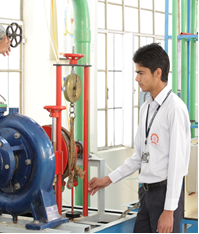 |
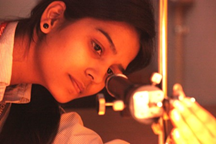 |
BUILDING MATERIAL LABThe Building Material Lab is equipped with experimental setup required for study of properties of various building materials. |
SOIL MECHANICS LABThe soil lab provides academic and research services through performing all lab tests needed for analysis and study of soil characteristics and its properties. |
CONCRETE LABConcrete is the most widely used construction material. The concrete laboratory tests every component in the concrete mix design as well as the concrete mix itself. The lab provides evaluation of the plastic properties of the mix as well as the hardened properties. |
ROAD MATERIAL TESTING LABTransportation lab consists of equipment used in the testing of bituminous materials such as viscosity, ductility and plasticity and other devices for super-pave testing of bitumen and aggregates. There are other devices for mix design by both Superpave and Marshall Methods. |
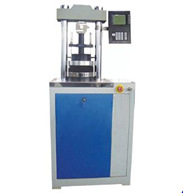 |
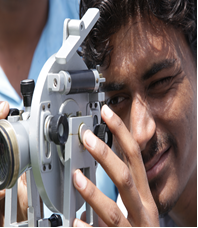 |
STRUCTURE ANALYSIS LABThe Structural Analysis Lab facilitates in the determination of the effects of loads on physical structures and their components. Results of the analysis are used to verify a structure’s fitness for use. |
ENVIRONMENTAL ENGINEERING LABThe Environmental Lab comprises of modern and technically advanced instruments needed for water and wastewater analyses. The lab has also many in-situ devices and equipment to perform different types of measurements and to take grab and composite water, wastewater samples. |
GEO TECHNICAL LABThe Geology lab is used for experiments related to crystallography and mineralogy. State-of-the-art facilities are also available for experiments on structural geology. |
SURVEY LABThe survey lab is used for surveying exercises and is equipped with all latest instrumentation viz levels, total stations, and GPS receivers sets for conducting ground surveying works. |
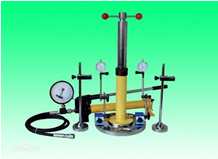 |
BUILDING PLANNING AND DRAWING LABBuilding planning and drawing lab in civil engineering is used for make the plan of any building, structure, etc. The various plan model of this lab are generally Study model of two story building, Study model of bifurcated stair, Study model of open well stair, Study model of flush door, Study model of racking shore, model of ventilated door, Study model of laced & bracing, Study model of shahs door, Study model of fully panel door, Study model of half panel & half glazed door etc. |
CAD LabThe CAD Lab is equipped with AutoCAD software and is extensively used for design and drawing. The knowledge gained in the lab eventually equips the students to provide quality service once employed in the industry. |

